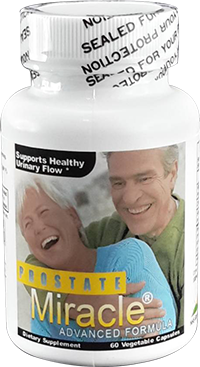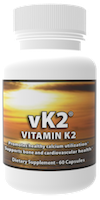Warning: This website is the only source for the authentic Prostate Miracle® Advanced Formula, which has ALWAYS contained Pine derived Beta Sitosterol.
Selenium Research
When was the last time your doctor suggested that you supplement with selenium in an effort to prevent cancer?
Probably never . . . But did you know that researchers have been studying the plausibility of such a suggestion?
Scientists know that this trace mineral has some extraordinary properties and have been aggressively investigating it's health supporting potential. Research is currently being conducted to see if selenium might have any impact on the risk of getting prostate cancers and other conditions involving oxidative stress and inflammation.
Doctors assume that we get enough selenium through plant foods. Unfortunately, in many places in America and the rest of the world, including China and Russia, the soil is badly depleted of its selenium content because of acid rain, which can dramatically change the chemical composition of the soil. As a result, soil acidification alters the ability of the soil to bind with vital elements such as selenium for assimilation into edible plants.
Selenium's Unique Biochemical Properties
What makes selenium unique? While scientists are still studying selenium’s role in a multitude of biochemical processes, one of its chief attributes is serving as a component of specific proteins called selenoproteins. Almost all of these proteins are active in the scavenging of free radicals.
Selenium is the only mineral nutrient that has its own DNA code, which instructs the body’s protein-synthesis “machinery” to incorporate selenium into its host proteins. Scientists interpret this unique attribute as evidence of selenium’s fundamental importance to virtually all living things on Earth.
Selenium is available from many dietary sources, including garlic, Brazil nuts, and certain vegetables; however, the amount of bioavailable selenium from these sources varies tremendously, depending on the soil and weather conditions where the plants are grown. Furthermore, many foods containing selenium also contain substances that limit selenium’s bioavailability. Therefore, selenium supplementation is often recommended as a way to assure a dependable, bioavailable supply of this nutrient.
As scientists continue to discover the many ways in which oxidative stress is related to inflammation and its destructive consequences—from atherosclerosis to prostate, lung, colon, and other cancers, trace minerals such as selenium are likely to be the subject of even more research.
Selenium Chelates versus Selenium Glycinate Complex
There is a great deal of confusion regarding selenium chelation. Many raw material suppliers provide, what they call a "selenium amino acid chelate", but that term is actually a misnomer. In order to clarify this often misunderstood subject, it is first necessary to understand chelation in general.
Most minerals are somewhat un-bioavailable because they typically carry a charge. This charge relates to the valance or state of free electrons in the outer shell of the mineral's atomic structure.
Regardless of whether the mineral is in the form of a salt or is in an ionic state, if it has a charge . . . it will have difficulty passing through cell membranes (where it is needed by the cells). This difficulty is due to interference from the charge of the cell membrane, which like the charge of a magnet, will either repel the same charge or attract the opposite charge. In either case, the charged minerals's ability to pass through the cell membrane will be impeded resulting in less than optimal bioavailability.
Chelation is a technique sometimes deployed to improve the bioavailability of these charged minerals. The idea is to wrap an amino acid molecule around the mineral so that it will bind to the mineral in two spots, resulting in a neutral, stable, chelated mineral, which can then pass through the cell membrane much easier than it's ionic or salt counterpart.
Chelation occurs when unpaired electrons become non-ionically bound to the electron deficient environment of the positively charged central ion. EVERY amino acid (including glycine) has both a carbonyl end and an amine end. Though, neither end functions as a "negative group", both ends have a set of unpaired electrons. Thus ALL amino acids can form coordinate complexes in two places making them ideal chelating agents.
Selenium has six valance electrons and typically carries a -2 charge. Furthermore, because it's outer shell is lacking only two electrons from having a closed shell configuration, it wants to receive a pair of electrons in order to complete it's shell. Once the shell is complete however, it is not possible to transfer another pair of electrons to it.
For this reason, it is physically impossible for any chelating agen such as glycine (or any other amino acid) to bond with a selenium ion in two sites, so by definition, selenium can not be chelated. In other words, there is no such thing as a selenium chelate.
None of those so called "selenium amino acid chelates" are actually chelates at all. They are typically just a selenium salt combined with a hydrolyzed vegetable protein, having a bioavailability that is not any greater than just the selenium salt or selenium ion.
It turns out that the best way to improve the bioavailability of selenium is to bond it to glycine (an amino acid), resulting in a selenium glycinate complex, which although not neutral, has a -1 charge, and as a result has a much easier time passing through a cell membrane than do mineral salts, ions or any of the so called "selenium chelates".
The selenium we use in Prostate Miracle® Advanced Formula is Albion® Selenium Glycinate Complex, made by Albion Laboratories, Inc., an industry leader in manufacturing chelated minerals since the 1950's. If there was a way to chelate selenium, they would certainly be producing it, but because it is not possible (due to the atomic structure of selenium), they produce the next best thing, which is Albion® Selenium Glycinate Complex.
It is worth noting that, the glycine used in producing Albion® Selenium Glycinate Complex is NOT derived from any GMO source. I am unaware of any prostate support formula out there (other than Prostate Miracle® Advanced Formula) that uses Albion® Selenium Glycinate Complex as it's source of selenium. Even if all of the other ingredients in a formula are derived from non GMO sources, if it contains one of those so called "selenium amino acid chelates", it is not likely that a legitimate "all non GMO ingredients" label claim can be made. Read Less
Other Products Available from: NHS Global Distributors LLC

Pectin Plus®
Supports healthy detoxification, healthy blood pressure, healthy cholesterol levels and prostate health
read more
Estrogen Balance®
A natural formula for Men & Women, combining: D.I.M., Quercetin and Flaxseed.
read more
Sea of Greens®
A Whole-Superfood supplement, combining an optimal blend of sea vegetables and Freshwater algae.
read moreInformation
Contact
255 Rivertown Shops Dr.
Suite 102, PMB 128
Saint Johns, FL 32259
International: 1.805.322.0005
Thank you for visiting Prostate-Miracle.com
This information here within is designed to provide accurate information in regard to the subject matter covered. It is provided with the understanding that NHS Global Distributors LLC is not engaged in rendering medical advice. If expert assistance is required, the services of a competent medical professional should be sought. These statements have not been evaluated by the Food and Drug Administration. These products are not intended to diagnose, treat, cure or prevent any disease. Always read and follow manufacturer's directions that come with this product.
You are protected by the FDA Dietary Supplement and Nonprescription Drug Consumer Protection Act
please call 877.965.2140 or Click here to report any Adverse Reaction with Prostate Miracle®.











